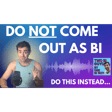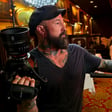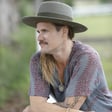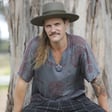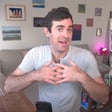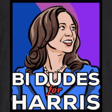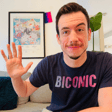Introduction to the Series
00:00:12
Speaker
Hello everyone, welcome back to Two Bye Guys and to the Bisexual Married Men mini-series in advance of the book coming out. As you guys know, By Married Men's Stories of Relationships, Acceptance, and Authenticity is out November 30th and in anticipation, or perhaps after release, I'm not sure when this will air, I'm interviewing many of the men who are in the book and providing some more context and
00:00:42
Speaker
and feedback and learning what they've been up to since.
Meet Cassidy Haley
00:00:45
Speaker
My guest today has one of the fascinating stories in the book, one of the most unique stories in the book, actually, but I know it's going to resonate with so many people. Welcome to Two Bye Guys, Cassidy Haley, aka Bennett. Welcome. Hello. Thank you.
00:01:04
Speaker
Yeah, you're Bennett in the book, but you're Cassidy in real life. I found the names by looking up the year you were born and where your name falls in the popularity chart. There's a social security website where you can look that up. And then I chose another name that was near yours in popularity for the year you were born. So I don't know how much do you identify with the name Bennett?
00:01:30
Speaker
um probably zero i had i mean i'm trying to think if i've even known anybody named bennett um no okay well we'll call you cassidy again today and we'll be the most authentic version of you but so people can connect it to the book this is bennett in the book cassidy in real life
00:01:54
Speaker
And it's been so long since I actually saw your face because our initial interview was in 2020. And we've been in touch since, but we haven't actually spoken on a video chat, so it's nice to see you. I'm excited to hear what you've been up to. Yeah, no, it's nice to see you too.
00:02:13
Speaker
I want to ask you this before we get into your story, if you can remember back to 2020. Barely. A lot of 2020 I've shut out of my mind and try not to think about it, but this was one of the nice parts of that year.
Why Bisexual Stories Matter
00:02:31
Speaker
Why did you decide to participate in this project? Well, I think it's
00:02:39
Speaker
You know, as a bisexual person, it's something that is really important to me for kind of our stories to be told. I didn't have any reference points really growing up for bisexual kind of lifestyles. And I think, you know, hearing that there are bisexuals that exist
00:03:04
Speaker
You know, a biracial is real and even as a bisexual person myself, I have to remind myself that I exist. So, you know, I just would love, I want to do my part to share those, share my story and make sure our stories are heard. And I really appreciate what you guys do and wanted to support the cause.
00:03:24
Speaker
Cool. Awesome. I love that. Okay, so I want to debrief sort of what's happened since then and other things about the project, but for those who haven't read it yet, which is probably most people.
00:03:40
Speaker
There's details in the book, but can you give us the brief overview of your trajectory toward discovering your bisexuality and your journey? Yeah. I come from California, the Bay Area, raised by a lesbian mother. Sexuality was really, in terms of acceptance in my family, was obviously not an issue from the beginning.
00:04:06
Speaker
So, you know, a lot of the struggles I faced were more about society internally and just trying to figure myself out. And I had been dating men and women pretty much consistently. More men, I'd say, but leading up to getting married to my ex-wife.
Cassidy's Marriage and Bisexuality Journey
00:04:28
Speaker
So I was married to a woman. We were together for five or six years.
00:04:34
Speaker
And in that time, I we had some ideas of openness, but I never wasn't with a man during that time. We're pretty monogamous. So, yeah, that's I mean, that's the gist of kind of the marriage aspect and leading up to it.
00:04:50
Speaker
cool. And before we dig into the marriage too, many of the men I interviewed and just so many bi men are straight identified for many years. We often come out later in life. Your story is different in that you had an awareness of your queer identity. And I think that was the word you told me you chose pretty early was queer. So not gay, but you kind of
00:05:17
Speaker
Knew you were queer. Right. Yeah, it was kind of reverse. I kind of had to come out to be with a woman. And I felt a lot of like like kind of straight guilt or just like I felt really weird to be walking down the street. And so kind of, you know, in a like with her, it just it all was very strange. So so used to kind of being like defiantly queer, defiantly bisexual or whatever. And in a lot of gay settings and queer culture.
00:05:47
Speaker
Yeah. When did the actual label, bisexual, begin to feel right for you? Well, I think it felt right from the beginning. But I wouldn't correct people when they called me gay. I wasn't really a big proponent of it, I think, until
00:06:10
Speaker
probably my late 20s, which is a little bit before I met my wife. So yeah, it was pretty late that I started to be like, no, I'm bisexual. You know, I think there was a lot of stuff around, like, bisexuality being a transition to being gay. So I didn't want to be like, no, I'm bisexual. You know, like, correcting people just seemed
00:06:31
Speaker
I don't know, counterproductive or something, but eventually I realized that actually it's really important to speak it because, you know, it's not something you can see on the skin. It's not something that's obvious and whoever, depending on who you're dating, you will appear one way or the other. So it's kind of really hard to pinpoint. So it's actually, I think it's really important to be upfront about it and talk about it and correct people about it. And so now I, now I do.
00:06:59
Speaker
What has that been like for you since I know you've been in relationships with multiple genders, like the perception of your sexuality from the outside? What's that been like? And how have you dealt with that? Well, I mean, it kind of sucks, to be honest. I kind of wish that, you know, I don't really wish that I was one or the other, but it sure would be easier.
00:07:20
Speaker
It's definitely made it hard to date women. I started to see a woman and she broke it off because of the bisexuality and she just couldn't really wrap her head around that. Some guys have had problems with it too. In fact, yeah, the last guy I dated had a hard time with it as well. So it's definitely been an issue.
00:07:45
Speaker
It's been an issue with the people I've dated and then it's also been an issue internally because I'm pretty open to who I would want to date. But I kind of feel like I have to focus on one or the other, you know, like, I don't know. And that's just that's just in my mind. It's not real. But
00:08:02
Speaker
It just feels that way, you know, like I'm going to date women now. Let me go find a woman. I'm going to date men now. Let me find a man as opposed to it just being more organic and natural and just meeting whoever shows up.
00:08:18
Speaker
I've heard that referred to as the buy cycle of going back and forth. Maybe we can unpack it, I don't know, but I'm curious. Why do you think it is that you feel like you have to focus on one or the other as opposed to just letting it happen?
00:08:38
Speaker
react, I kind of behave very differently in both settings. And it's probably something I could work on. I don't know if it's the healthiest, but it's just the reality. Maybe I'm responding to what I think society thinks or what I think women want versus what men want.
00:08:59
Speaker
But I definitely have different behaviors depending on who I'm dating. Yeah.
00:09:09
Speaker
Yeah, I remember that was a big part of your story in the book. I encourage everyone to check it out and read through
Ending of the Marriage and Personal Growth
00:09:16
Speaker
it. So let's talk about your marriage for a little bit. When you got into that relationship, how was it different from your relationships before then? What changed in your life when you got into that relationship?
00:09:30
Speaker
Well, I was ready to settle down. That's for sure. I had kind of had some, I don't know, like a little more wild times, I would say. And I had just gotten really fed up with kind of hookup culture, gay hookup culture, particularly. And I'd taken a few months off from being with men at all.
00:09:57
Speaker
And I was just really ready for something different. But the way that we got together was extremely organic. We were friends for quite a while first and just kind of happened to be on the same trip together. We actually were supposed to ride mutually with a friend to a festival and the friend ended up canceling at the last minute. So it was just the two of us and we had really only met a few times.
00:10:27
Speaker
And then we got to the festival and she had forgotten a tent. And so she ended up sleeping in my tent. And then one thing led to another and that was that. Forgot the tent. Is that a good excuse? It could be. It worked. It worked. That's for sure.
00:10:45
Speaker
Cool. And how did that relationship progress and how did it intersect with your bi identity or your perception of your sexuality? Well, we started dating what I thought was casually and I think she presented more casually than she was actually taking it.
00:11:09
Speaker
And then I actually met a guy and was in a relationship with a guy for a year. Kind of, you know, we had not lost touch, but we just weren't. It didn't like ramp up really quickly. It was more like casual sex friends in my mind.
00:11:30
Speaker
Later I would find out that actually it was quite traumatizing to her and she felt rejected and that actually came up quite a bit over the years that we were together because the idea, because I had basically left her for a man. Which in my mind was not the case, but I probably wasn't the most observant or aware of her real feelings.
00:12:00
Speaker
Was she supportive of your bisexual identity or did that cause any conflict? No, she was supportive. I mean, she's bisexual as well, so I think that was partly what drew her to me.
00:12:15
Speaker
But she had a lot of conditions. Like we talked about being open in some ways, like her having a female lover and me having a male lover. But like she wanted me to be friends with a guy for a year before I had sex with him, which, you know, it's just a little unrealistic in gay culture. So.
00:12:40
Speaker
There was a lot of kind of in practice, like in theory, she was okay. But in practice, it just kind of there was always a reason why it didn't work out one way or another. But, you know, I mean, I was also that those five years without being with a man were actually really important to my kind of healing and growth around some of the unhealthy sexual interactions I'd had with men previously. So
00:13:06
Speaker
It was actually fine, even though it was something I kind of yearned for. I think it was actually really, really good that I had a long period of time without re-engaging in male sexuality. I want to ask you more about that. But before we get there, since I know that your marriage ended, why did it end? What happened?
00:13:33
Speaker
Oh, um there's a lot in the book that I know that that uh explains it so I don't know how how you want to summarize it but yeah well I should tell you she actually died since the interview. Oh I'm so sorry to hear that. Yeah it was pretty rough uh really just a few months ago actually. Oh my god um and you know we hadn't talked in years so
00:14:03
Speaker
You know, she wasn't it's not somebody who's in my life now. So it's you know, it's like it's not in front of me, but Obviously it was very I mean she was Up to this point like the love of my life. So it was really hard but So You know, I don't know my perception maybe of how it all went down might be slightly altered by that reality, you know in terms of how
00:14:32
Speaker
I think about it and talk about it and that sort of thing. But we Yeah, we
00:14:41
Speaker
You know, we were both really traumatized and we loved each other and we had like amazing sex, oh my God, like every single day. I miss that so much. But emotionally, we both were pretty inept at having healthy relationships. And, you know, I look back and I think that if I was who I was, if I was who I am now then,
00:15:08
Speaker
I could have probably really been much more present and able to kind of deal with what she was going through, which no one should have to be responsible for somebody else's kind of mental health. But at the same time, people can support each other if they have a foundation
00:15:32
Speaker
to work from and I really didn't. So I couldn't be what she needed and she can be what I needed. And yeah, it kind of went down in a...
00:15:45
Speaker
a flaming pit of bisexuality, really, because she brought in a man to the relationship that she thought would be kind of for both of us, but then ended up just being for her. And I felt extremely rejected and it ended up kind of pushing me away.
00:16:08
Speaker
If you're comfortable answering, how has her passing away affected how you think of the relationship and or her in general? Well, I think it's allowed me to think a lot more. Well, I think it showed me how much I really care about her because, you know, the breakup was pretty painful. And so I kind of had to numb myself to my feelings for her quite a bit.
00:16:38
Speaker
And especially because I couldn't have contact for my own kind of health and safety. I didn't really allow myself to think about the good parts of our relationship as much. And so, you know, once she passed it, I was able to think about that more. So it actually made, you know, the grieving more and more extreme because, you know, we really were
00:17:07
Speaker
in so many ways, like so complimentary and just our visions for the world. And she always, she tried really hard to do, like to make things better. And she just had a really hard time making things better because of her own history and trauma and whatnot.
00:17:34
Speaker
You mentioned that you have changed a lot since then. If you are the person you are now, it might have been different. How have you changed since then? Well, I've addressed so much of the kind of
00:17:52
Speaker
limiting beliefs that arose from early childhood trauma in a lot of different ways, therapy, various spiritual practices, some medicines, plant medicines. And yeah, I feel like an adult now.
00:18:17
Speaker
You know, and I mean, I'm 43 and I was 30 when I met her, but I didn't feel like an adult at 30 at all. You know, I felt like a child, a scared child. And now I feel much more solid in myself and much more aware of my boundaries, what I'm willing to kind of put up with and stand for and. Mm hmm.
00:18:42
Speaker
Honestly the biggest thing is that like I found it and this is I mean this sounds so cheesy, but like I found a self-love That was never there. I had really because of the you know childhood sexual trauma. I Felt very you know, I felt like just unworthy unlovable I kind of hated myself and doing the work that I did really uncovered that and I was able to like do a lot of kind of like I
00:19:10
Speaker
you know, inner child stuff. And and the I actually I did something called Ibogaine, which is a pretty intense psychedelic treatment. It exists culturally, maybe similarly to ayahuasca. But in practice, it's very, very different. And it's like they use it to treat heroin addicts. But it's also really good for trauma.
00:19:36
Speaker
And it's a pretty extreme experience where you're isolated in a room alone and you sensory deprive, you know, you cover your eyes and cover your ears and you're just alone there for like 24 hours with one practitioner who comes in and like checks on you and guides you through it. But
00:19:58
Speaker
It that was the thing that really I think had the most impact on the trauma that I went through and showed me kind of like the lineage of of of abusers and victims getting things getting you know karma the kind of karmic wheel of these things you know hurt people hurting people.
00:20:15
Speaker
And just kind of showed me, it just gave me this like sense of peace around the things that I was taught and wasn't taught about how to protect myself. And also, yeah, just a sense of like loving who I am and who I was and kind of understanding how it all happened. And yeah, it was huge. It was huge, absolutely life changing.
00:20:40
Speaker
Wow, fascinating. And that's so awesome that you went through that and have done all this work. You're not the only person in the book who has benefited from a plant medicine spirituality experience.
Healing Through Plant Medicine and Therapy
00:20:56
Speaker
I think for some reason, you know, many queer people need to like access and unlock some stuff that's buried and that can help.
00:21:06
Speaker
Yeah, I mean I think I mean most people experience trauma because of you know society Um, and we just we we don't live in a in a society that's conducive to people really being healthy um, but um LGBT people I think have um
00:21:27
Speaker
a unique kind of version of that that can be pretty extreme because of the lack of acceptance, the lack of any kind of blueprint about how to exist in the world, and just kind of, you know, having to like resist the perception of like moral, you know, fortitude or something like moral
00:21:52
Speaker
Like resist the kind of like murky perceptions of like what is right and what is wrong and right that we're given
00:22:00
Speaker
to sort of break down the structures of the heteronormative world and then sort of create your own path. You need a sort of almost psychedelic vision sometimes to get there because the things we're taught are very deeply ingrained in this society. Yeah, it's so deep inside us that it's not enough to be aware of it because it's still there. We still
00:22:24
Speaker
in subtle ways, try to be what I think society wants a man to be. Right. Me too. Yeah. Right. Even once I knew a lot of things intellectually, it took a while to feel that in my body. And there's still things I still struggle with that I know, but I don't quite know in my body yet. It's interesting, you mentioned limiting beliefs because I'm actually in
00:22:54
Speaker
the middle of a life coach certification program to become a life coach. And we talk a lot about limiting beliefs. I'm just curious, aside from the plant medicine, what other work did you actually do that you're talking about? You mentioned therapy, but
00:23:11
Speaker
Yeah, well, I mean, I did EMDR therapy, which was really what kind of uncovered the traumatic experiences. I had known certain things had happened, but with EMDR, you know, you really go back and I was able to have like memories of things that happened.
00:23:32
Speaker
Which You know was really great to just uncover it, you know, I mean it wasn't great but it's in the end necessary To see that and to know that it's real and to know that it's not just a Fantasy or something or that you just made it up that these things actually happened. So that was extremely helpful and
00:23:59
Speaker
Cool. Cool. That's awesome. So we last spoke about your life story in 2020. You mentioned a couple things that have changed since then, but what else has changed in your life since then, and I guess more specifically with your sexuality, identity, or dating, or things like that?
00:24:23
Speaker
Um, yeah, I mean, I think it's just like I went through a long period of celibacy. Um, I think you were in that period when you spoke. Yeah, probably. Yeah. And so, you know, I just like did like a really major kind of reset of around sexuality.
00:24:41
Speaker
that I'm still trying to figure out and still understand. But I feel like I have a much better kind of grasp of it. I feel like I'm ready. I'm ready to like be in a relationship again. I'm ready to. Yeah, I'm ready to be in love. And I was and I wasn't during most like that entire time since kind of realizing that that I had all this work to do.
00:25:11
Speaker
Was the period of celibacy helpful? Like what did it teach you? Well, the thing is that because the early sexual trauma was with men, pretty much all kind of like most of the engagement, like most of the kind of sexual experiences I had had some level of like kind of re-traumatization
00:25:39
Speaker
Um, it was just really hard to separate out some of the kind of PTSD. Um, because what, I mean, what happens when you experience sexual trauma is you kind of collapse, or at least what happened to me is you collapse fear and arousal. They kind of like intertwine and it's hard to tell the difference. And so you're afraid, but you think you're aroused or you're aroused and you get afraid. And so.
00:26:04
Speaker
Like the long period with my wife was really helpful for this. And then the period of celibacy that I did after that was also extremely helpful just to decouple those things. Um, just to not, just to stop re traumatizing myself with experiences. Um, because I just did, I couldn't understand what I was, what I was really.
00:26:26
Speaker
attracted to, you know, people that were not safe. I felt attracted to because that fear and arousal were so intermingled, you know. So, yeah, it was just really, really helpful to have just a reset of that. Cool. What do you hope that people who read your story in the book will take from it or get out of it?
Family Acceptance and Cultural Identity
00:26:55
Speaker
I don't know. I hope they get out of it. I guess just people that are going through maybe what I've gone through, a sense of camaraderie or just that other people have gone through this. I think that it's possible to be bisexual in this world and
00:27:18
Speaker
to be open about it and to have relationships. I'm self-censoring in this moment because I've been talking about trauma and not being able to date and all these things where it's the opposite of what I would hope people are left with. But at the same time, I feel like I have been able to overcome a lot of the things that
00:27:45
Speaker
Some people would have a hard time overcoming or, you know, I've started from a place. I mean, just, you know, coming from a family that was accepting is is a huge, you know, kind of like I think can be an example of what happens when you are accepting of children, where you can kind of let them be themselves and decide for themselves who they are.
00:28:08
Speaker
Um, and I think a lot of men don't get that and it really kind of hinders their ability to be themselves and be bisexual. Um, so yeah, you know, I mean, I, I'd like to come back when I had, when I'm like,
00:28:24
Speaker
in a happy relationship and be like yes this is it works you know you can be bisexual um so you know let's hope for that yeah but um yeah i think that um you know i've just i've come really far with what i've been given and um i yeah just i i hope people
00:28:48
Speaker
can find some inspiration in their own lives to do the work that they need to do and be who they are, even though it might be hard and society might kind of, you know, try to keep them down or even though it's, there's things in the world that seem unfair or like they're hindering you.
00:29:06
Speaker
Right. I actually think your answer isn't a contradiction. It makes perfect sense to me and even especially your vulnerability and openness about the traumas in your life and how you did work to address those things is actually so warm. I don't know. I've got this warm feeling of like,
00:29:31
Speaker
you know, yes, I hope you find a wonderful relationship and you're happy in one at some point, but that we often look at things like that as the goal and we look at relationships ending as a failure. But actually, to me, the goal is what you just ended with is becoming more yourself and tapping into that and, you know,
00:29:55
Speaker
being authentic and living authentically. And it's so clear that even all of the experiences in your life that were not so positive at the time have led you to this place where you're ready for whatever's next. That's my observation. I appreciate that. And I think you're right. I think being where I am now is actually a huge accomplishment. And I think that
00:30:23
Speaker
you know, not not giving up, even though it seems daunting because. Even though I did have a loving family like a child of sexual trauma, like the cards are stacked against you and then being bisexual on top of that, there was just there was a lot to overcome and, you know, process and in order to find like a healthy place with my sexuality, which I have, which I have.
00:30:50
Speaker
Right, right. I think there's another common misconception out there that people with more trauma are more broken or damaged or things like this, but I think that's possible. But it's also possible that these people become the strongest because you confront so much and learn to overcome all these things. So I think that's beautiful.
00:31:24
Speaker
What did you learn, if anything, about yourself by participating in this project? I think it was just
00:31:35
Speaker
Yeah, it was just it gave me a really good perspective on my life and what I've gone through and what I've experienced. And I hadn't quite I mean, I journal a lot, but and I've obviously told talked about my story to friends and whatnot, but I haven't quite like put it into such a concise narrative and, you know, had somebody kind of draw out specifics and whatnot. So, yeah.
00:32:04
Speaker
When you reread it recently, did you notice anything surprising or have any surprising reactions? I mean, I think it was a little uncomfortable to like just, you know, have like I have nothing to hide and I'm very happy to be involved. But just to see it on paper was a little like
00:32:26
Speaker
Oh, that's there. There it is. Yeah. And so what went through your mind? Like, how did you push through that discomfort? Like, Oh, well, it didn't. It wasn't like severe. I mean, it didn't like I didn't have any thoughts about it. It was just kind of like, Oh, that's interesting that I feel that way. But it's not like I would want to stop it or anything. Like, I'm very, I'm happy to be involved. And I like, you know, I really appreciate what you guys are doing. And
00:32:56
Speaker
So yeah, it wasn't, there wasn't really, but it just was like a kind of like an gut reaction of like, Oh, it's, you know, the vulnerability sharing yourself.
00:33:06
Speaker
I totally understand that. I mean, I wrote about myself in the book, but at least I got to like think about each sentence and edit it. It wasn't verbal. But then I was recently interviewed in like a as told to article, so it's not even printed as an interview, it's printed as just all my words. And I read it kind of like, did I say all those things? I identify with that feeling you had.
00:33:34
Speaker
But I was also happy it was there, but sometimes you see something you've said printed. And it's like, oh, that sounds different than it did in my head or something. I remember one thing we talked about in the initial interview was you had an interesting perspective on like, I think this was you or tell me if it wasn't, but how like,
00:34:00
Speaker
who we're attracted to ends up also determining your cultural identity. Can you talk about that or have your thoughts on that evolved since then? I think they have a little bit, but I'm not sure if that's just getting older. I think
00:34:24
Speaker
Identifying with culture is something that's really important when you're young. People really kind of hold to their tribe or whatever. The people that surround them really help them identify who they are.
00:34:38
Speaker
And then I think as you get older, you just kind of it's not as important or you aren't as much of a part of these things of cultural movements or whatever. So it's I think now, even even just three years later, it's it's less of kind of something that like I think about. But I mean, I have realized that being bisexual has kind of kept me a bit on the outside of straight and gay culture.
00:35:09
Speaker
I mean, I specifically remember having been with my wife for five years and coming out of it and re-entering the gay world and meeting gay people and just not understanding their references, jokes that they would make, cultural references.
00:35:27
Speaker
little things like that. And so I still feel kind of behind in that arena, you know, like I don't really feel like I fit into gay culture. But I certainly don't fit into straight culture either. But you know, I'm an artist and I do fit into artist culture. So I've kind of really found a home there with fellow performers and
00:35:48
Speaker
Um, people I have, I have a really kind of robust artistic community that is, um, pretty like across the spectrum sexually. So cool. That's great. So I know that you never applied a gay label to yourself, but you did spend a lot of time in the gay community, uh, or especially earlier in your life.
00:36:14
Speaker
I'm noticing a lot more gay men, in addition to straight men, also questioning the binary-ness of their sexuality. They're attached to the gay label for cultural reasons, but then maybe thinking, is there more to it? Since you identify with some of that experience, do you have advice for that group of men? Yeah. Well, it's interesting how
00:36:45
Speaker
I mean, would you call that like heterophobia or something, like biphobia? How it is actually a thing, you know? I mean, I know that like even within like the public eye, there's some gay, you know, there's some gay artists that like,
00:37:08
Speaker
have had bisexual experiences that don't want to talk about it because, you know, they're considered themselves a gay artist. And when people do like Lil Nas X just kind of came out talking about how he might be interested in
00:37:27
Speaker
know, dabbling in the other direction. He I think he used a much more kind of profane way to talk about it. But and I think there was there was even some pushback there, you know, and so it's definitely a thing. But I think and I think also the same reasons why I was like didn't want to correct people early on is probably something that holds people back because there is this whole like bisexuality is the way to be is like the
00:37:56
Speaker
intro to being gay and people oh yeah sure you're bisexual you know that kind of vitriol of like you're not really bisexual you're gay but bisexual is easier for people to understand and so you say you're bisexual and so that kind of creates the stigma
00:38:12
Speaker
where like I certainly felt like I didn't want to kind of go like be the person that's like, no, I'm bisexual. But I mean, just like I experienced for myself, I think it is actually really important to talk about it if it's there. And, you know, and I do know quite a few men who consider themselves gay, who would love to have experiences with women and talk about it and wish they could and just don't have an outlet or an avenue
00:38:42
Speaker
um And that I do not have in my song because I am not I have just as many issues I would love to meet more women um, but um Yeah, I think it's just like being really open about it is is something that will be really helpful for for everybody, you know, and as as things progress
00:39:05
Speaker
Yeah, I agree, right. Whatever your label, the more we're talking about this kind of fluidity and normalizing it, then the less scared people will be of exploring it, wherever they land. And I agree with you about women not always being interested, but to all the women out there,
00:39:27
Speaker
bi and gay men make the best lovers, which is a lot of experience. Has your bisexuality affected your conception of gender, either your own or your gender expression or just gender in general?
Understanding Attraction and Gender Roles
00:39:47
Speaker
That's a good question. I mean, I think in a lot of ways, I fetishize gender.
00:39:56
Speaker
So I fetishize masculine men and feminine women. And I think that partly has something to do with the bisexuality. I'm definitely attracted to more feminine men as well. But in general, when I think of what I'm attracted to, it's kind of like this
00:40:23
Speaker
I mean, I grew up reading comic books. So, you know, I have like a kind of like superhero thing. So, you know, it's like very like masculine, heroic men and very feminine.
00:40:38
Speaker
Uh, women. Um, so, you know, maybe the bisexuality has something to do with that. I don't know. Um, but I actually think that like, I think just as much as it's, um, great for people to explore.
00:40:54
Speaker
gender on all sides. It's also really great to it. Like it's it's great to affirm like kind of traditional gender as well. You know, I think that that I think that we've kind of lost that a little bit where it's like we celebrate people that kind of go against the binary. But I mean, we're all like worthy of
00:41:20
Speaker
We all we're all into different things. We're all worthy of being celebrated. And so kind of like I've just kind of really leaned into it a bit and just been unapologetic like this is this is what it is for me. And this is what I find interesting. And I think there's a place for all of it.
00:41:39
Speaker
love that. I totally agree.
Healthy Masculinity and Vulnerability
00:41:42
Speaker
Something you mentioned, I think it's at the end of your chapter, you talked about the importance of healing men, and specifically sort of reconciling masculinity.
00:41:56
Speaker
And you kind of, it seemed like, had a perception that it's a bigger deal than just healing those individual men. Am I reading that correctly? Or like, why is it important to heal men in general?
00:42:13
Speaker
think just like we're going through a phase where men are just getting like they're just so they're just kind of getting destroyed you know it's like they're lost and nobody has a blueprint for healthy masculinity nobody you know it's like their masculine traits are being
00:42:38
Speaker
And a lot of ways attacked, you know, I think by health. There's there's really no concept of healthy masculinity. And there's just it's really like men just they don't they're they don't know how to express themselves. They don't know how to be themselves. They don't know how to embrace the different parts of themselves and whatever that is. And any time you are
00:43:07
Speaker
like separating things out so drastically, like men are like this, men are like that, men are like this. It can get like sticky, you know, or something like. Yeah. I really think we have like very kind of biological differences. But in the end, we're all like the same spirits and we're all capable of
00:43:37
Speaker
greatness and horribleness. But men have been given kind of the horrible kind of perception much more than women. And the truth is both men and women can be horrible and both men and women can be great. But men's greatness is not being celebrated and their horribleness is really being kind of and in a lot of ways, I mean, I can I can understand how their
00:44:06
Speaker
you know, a lot of men have done a really a lot of awful things. Um, and I think, you know, the, the, the negative things that men are capable of are, are tend to be more like physical, you know, there, there's more in your face. Um, but my gosh, I mean, women are just as capable of doing horrible things. It's just usually more manipulate like under the surface and manipulative. And I think that we've got to a place where men are just getting such a bad rap.
00:44:35
Speaker
And they could really just use some love and some acceptance and some guidance and, you know, like some purpose and that.
00:44:51
Speaker
You know like with this like they say that like a woman's biggest fear is her for personal safety and a man's biggest fear is being ostracized from society and I think that You know men want to they want to fit in they want to be accepted They want to be in society, but it's really hard to know how to do that now So it's just
00:45:18
Speaker
And that is detrimental to the society because that's half the population. You know, we all need to be kind of in a better place for everything to get better. Yeah. Yeah. So what does healthy masculinity look like to you? This could be a five hour discussion, but what's your vision for that? Well,
00:45:44
Speaker
I mean, I think vulnerability for sure is part of it. I think just being honest and real with yourself, even if it's uncomfortable. And even if that reality is, um, something that is what, you know, that somebody might consider to somebody to be ashamed of, or, um, you know, I think that in order to not be ostracized by society, men often feel like they have to hide parts of themselves. And I think that,
00:46:13
Speaker
You know, that's the saying, right? Vulnerability is strength. I think that's actually quite accurate because when you can accept yourself and embrace yourself, whatever that is, um, then you're a lot stronger for it. Um, and you know, I think that like men shouldn't be afraid to explore their softer qualities, but also their,
00:46:39
Speaker
like mask, like really masculine qualities, you know, like martial arts and like hunting and, you know, some of these like primal things that especially I think with gay men sometimes feels or queer, you know, queer people, it feels like those things are almost like like we've spent so long trying to be accepted for some of like the more like softer qualities that gay men exhibit that we almost don't feel comfortable embracing.
00:47:09
Speaker
like, you know, more traditional masculine elements. Yep. Cool. Agree.
00:47:23
Speaker
Thanks everyone for listening to this episode featuring Cassidy, part of the Bisexual Married Men series. The book is available now everywhere. Thanks everyone who already picked up a copy. I hope you're enjoying
Conclusion and Where to Find More Content
00:47:34
Speaker
it. I hope you enjoy Cassidy's chapter, aka Bennet. You can find the book wherever you shop for books. You can also head to my website, robertbrickscohen.com, and read more about the book.
00:47:44
Speaker
and find some links to purchase as well as upcoming events. And there's more of this episode with Cassidy. There's a little bit more than 10 extra minutes with him. We talked about some things that he's still struggling with related to sexuality and dating especially. I also asked him what about his sexuality brings him joy. It was a little difficult for him to answer. He wasn't quite sure and he hadn't thought about it that way.
00:48:08
Speaker
But reflecting on it produced some interesting results, so I'd encourage you to check it out. You can also see full video of Cassidy and I chatting with each other over at Patreon. Head to patreon.com slash Robert Brooks Cohen. There's a link in the show notes. It's only $5 a month, and you can see video from this entire series, as well as bonus content. So thanks everyone who's already supporting me there on Patreon. And now here is the very tail end of my conversation with Cassidy.
00:48:40
Speaker
Well, thank you again for participating three years ago and thank you for staying in touch and being with us again today. Um, your, your openness and vulnerability is, is like beautiful and such a strength that I see. And like, I know that a lot of people are going to identify with your story in the book and I'm really glad it's in there. Thanks. I'm happy to be involved. Yeah. Cool. And thanks for being here today. This was great.
00:49:10
Speaker
Absolutely. Two Bye Guys is produced and edited by me, Robert Brooks Cohen, and it was created by me and Alex Boyd. Our logo art is by Caitlin Wineman. Our music is by Ross Mincer. We are supported by the Gotham and we are part of the Zencaster Creator Network. Visit patreon.com slash Robert Brooks Cohen for bonus content, early access, and exclusive video episodes. Thanks for listening to Two Bye Guys.

